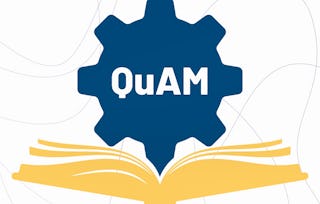Dieser Kurs vermittelt ein grundlegendes Verständnis von Modellen des maschinellen Lernens (logistische Regression, mehrschichtige Perceptrons, Faltungsneuronale Netze, Verarbeitung natürlicher Sprache usw.) und zeigt, wie sie komplexe Probleme in verschiedenen Branchen lösen können, von der medizinischen Diagnostik über die Bilderkennung bis hin zur Textvorhersage. Durch praktische Übungen werden Sie diese Datenwissenschaft-Modelle auf Datensätzen implementieren und dabei Kenntnisse über Algorithmen des maschinellen Lernens mit PyTorch erlangen, die von führenden Technologieunternehmen wie Google und NVIDIA verwendet werden.

Einführung in das maschinelle Lernen

Einführung in das maschinelle Lernen



Dozenten: Lawrence Carin
240.138 bereits angemeldet
Bei enthalten
3,809 Bewertungen
Was Sie lernen werden
Erläutern Sie verschiedene Modelle des maschinellen Lernens und wie sie komplexe Probleme in verschiedenen Branchen von der medizinischen Diagnostik bis zur Textvorhersage lösen können.
Implementierung von Modellen der Datenwissenschaft auf Datensätzen durch praktische Übungen.
Kompetenzen, die Sie erwerben
- Kategorie: Angewandtes maschinelles Lernen
- Kategorie: Medizinische Bildgebung
- Kategorie: Python-Programmierung
- Kategorie: Lernen übertragen
- Kategorie: Künstliche neuronale Netze
- Kategorie: Rekurrente Neuronale Netze (RNNs)
- Kategorie: Faltungsneuronale Netzwerke
- Kategorie: Reinforcement Learning
- Kategorie: PyTorch (Bibliothek für Maschinelles Lernen)
- Kategorie: Bildanalyse
- Kategorie: Überwachtes Lernen
- Kategorie: Computervision
- Kategorie: Logistische Regression
- Kategorie: Deep Learning
- Kategorie: Unüberwachtes Lernen
- Kategorie: Verarbeitung natürlicher Sprache
- Kategorie: Maschinelles Lernen
- Der Fähigkeiten-Abschnitt ist eingeklappt. 7 von 17 Fähigkeiten werden angezeigt.
Wichtige Details

Zu Ihrem LinkedIn-Profil hinzufügen
24 Aufgaben
Erfahren Sie, wie Mitarbeiter führender Unternehmen gefragte Kompetenzen erwerben.

In diesem Kurs gibt es 6 Module
Der Schwerpunkt dieses Moduls liegt auf der Einführung in die Konzepte des maschinellen Lernens mit so wenig Mathematik wie möglich. Wir werden grundlegende Konzepte des maschinellen Lernens vorstellen, darunter die logistische Regression, eine einfache, aber weit verbreitete Methode des maschinellen Lernens (ML). Ebenfalls behandelt wird das mehrschichtige Perzeptron (MLP), ein grundlegendes neuronales Netzwerk. Das Konzept des Deep Learning wird erörtert und auch mit einfacheren Modellen in Verbindung gebracht.
Das ist alles enthalten
23 Videos3 Lektüren10 Aufgaben3 Unbewertete Labore
In diesem Modul werden wir die mathematischen Grundlagen des Lernens von tiefen Netzwerken erörtern. Wir werden zunächst durcharbeiten, wie wir das Problem des Lernens von tiefen Netzwerken als ein Minimierungsproblem einer mathematischen Funktion definieren. Nachdem wir unser mathematisches Ziel definiert haben, werden wir Validierungsmethoden einführen, um die Leistung der gelernten tiefen Netzwerke in der realen Welt abzuschätzen. Anschließend werden wir erörtern, wie der Gradientenabstieg, eine klassische Technik der Optimierung, verwendet werden kann, um dieses mathematische Ziel zu erreichen. Schließlich werden wir erörtern, warum und wie der stochastische Gradientenabstieg in der Praxis zum Lernen tiefer Netzwerke eingesetzt wird.
Das ist alles enthalten
6 Videos3 Aufgaben2 Unbewertete Labore
In dieser Woche geht es um das Training des Modells, das Transfer-Lernen und die Feinabstimmung. Neben dem Erlernen der Grundlagen eines CNN und seiner Anwendung wird auch die Intuition des CNN sorgfältig erörtert, um ein konzeptionelles Verständnis zu vermitteln.
Das ist alles enthalten
8 Videos4 Aufgaben2 Unbewertete Labore
In dieser Woche wird die Anwendung neuronaler Netze auf die Verarbeitung natürlicher Sprache (NLP) behandelt, von einfachen neuronalen Modellen bis hin zu komplexeren. Es wird das grundlegende Konzept der Worteinbettung besprochen und wie solche Methoden beim Lernen von Modellen und bei der Verwendung für verschiedene NLP-Anwendungen eingesetzt werden. Es wird auch eine breite Palette neuronaler NLP-Modelle besprochen, darunter rekurrente neuronale Netze und insbesondere Modelle mit Langzeitgedächtnis (LSTM).
Das ist alles enthalten
13 Videos4 Aufgaben2 Unbewertete Labore
Diese Woche behandeln wir eine Einführung in das Transformer Network, ein Modell für tiefes maschinelles Lernen, das flexibler und robuster ist als ein rekurrentes neuronales Netzwerk (RNN). Wir beginnen mit einem Überblick über verschiedene Bausteine des maschinellen Lernens in einem Transformer Network: Innere Produkte von Wortvektoren, Aufmerksamkeitsmechanismen und Sequenz-zu-Sequenz-Codierer und -Decodierer. Dann werden wir all diese Komponenten zusammenfügen, um das komplette Transformer Network zu erkunden.
Das ist alles enthalten
12 Videos
Diese Woche behandeln wir Reinforcement Learning, ein grundlegendes Konzept des maschinellen Lernens, bei dem es darum geht, geeignete Aktionen durchzuführen, um die Belohnungen in einer bestimmten Situation zu maximieren. Nachdem wir die ersten Schritte des Reinforcement Learning kennengelernt haben, gehen wir zum Q Learning und zum Deep Q Learning über. Wir werden den Unterschied zwischen den Konzepten Exploration und Exploitation erörtern und warum sie wichtig sind.
Das ist alles enthalten
10 Videos1 Lektüre3 Aufgaben2 Unbewertete Labore
Dozenten



Mehr von Maschinelles Lernen entdecken
 Status: Vorschau
Status: VorschauThe University of Chicago
 Status: Vorschau
Status: VorschauO.P. Jindal Global University
 Status: Kostenloser Testzeitraum
Status: Kostenloser TestzeitraumAlberta Machine Intelligence Institute
 Status: Kostenloser Testzeitraum
Status: Kostenloser Testzeitraum
Warum entscheiden sich Menschen für Coursera für ihre Karriere?

Felipe M.

Jennifer J.

Larry W.

Chaitanya A.
Bewertungen von Lernenden
- 5 stars
74,95 %
- 4 stars
20,16 %
- 3 stars
2,94 %
- 2 stars
0,68 %
- 1 star
1,26 %
Zeigt 3 von 3809 an
Geprüft am 7. Mai 2021
The course gave a very clear understanding of machine learning from the basics to the key technology. Furthermore, this knowledge is made practical via Lab videos and assignment
Geprüft am 26. Juni 2021
Thanks to Coursera I now know the basic machine learning models as well as how I can implement them to solve real world problems. Excellent instructors and learning resources!
Geprüft am 25. Mai 2020
It's really an amazing field to learn new things and from institute is like Amazing to me I've learnt more ...it's not at all boring and we'll will be excited for future experience with you ?

Neue Karrieremöglichkeiten mit Coursera Plus
Unbegrenzter Zugang zu 10,000+ Weltklasse-Kursen, praktischen Projekten und berufsqualifizierenden Zertifikatsprogrammen - alles in Ihrem Abonnement enthalten
Bringen Sie Ihre Karriere mit einem Online-Abschluss voran.
Erwerben Sie einen Abschluss von erstklassigen Universitäten – 100 % online
Schließen Sie sich mehr als 3.400 Unternehmen in aller Welt an, die sich für Coursera for Business entschieden haben.
Schulen Sie Ihre Mitarbeiter*innen, um sich in der digitalen Wirtschaft zu behaupten.
Häufig gestellte Fragen
Um Zugang zu den Kursmaterialien und Aufgaben zu erhalten und um ein Zertifikat zu erwerben, müssen Sie die Zertifikatserfahrung erwerben, wenn Sie sich für einen Kurs anmelden. Sie können stattdessen eine kostenlose Testversion ausprobieren oder finanzielle Unterstützung beantragen. Der Kurs kann stattdessen die Option "Vollständiger Kurs, kein Zertifikat" anbieten. Mit dieser Option können Sie alle Kursmaterialien einsehen, die erforderlichen Bewertungen abgeben und eine Abschlussnote erhalten. Dies bedeutet auch, dass Sie kein Zertifikat erwerben können.
Wenn Sie ein Zertifikat erwerben, erhalten Sie Zugang zu allen Kursmaterialien, einschließlich der benoteten Aufgaben. Nach Abschluss des Kurses wird Ihr elektronisches Zertifikat zu Ihrer Erfolgsseite hinzugefügt - von dort aus können Sie Ihr Zertifikat ausdrucken oder zu Ihrem LinkedIn-Profil hinzufügen.
Ja. Für ausgewählte Lernprogramme können Sie eine finanzielle Unterstützung oder ein Stipendium beantragen, wenn Sie die Anmeldungsgebühr nicht aufbringen können. Wenn für das von Ihnen gewählte Lernprogramm eine finanzielle Unterstützung oder ein Stipendium verfügbar ist, finden Sie auf der Beschreibungsseite einen Link zum Antragsformular.
Weitere Fragen
Finanzielle Unterstützung verfügbar,


